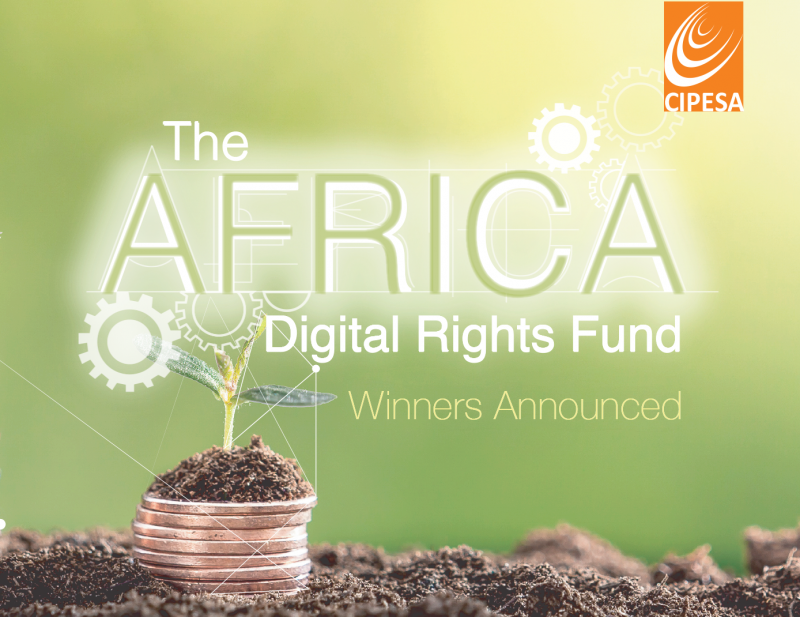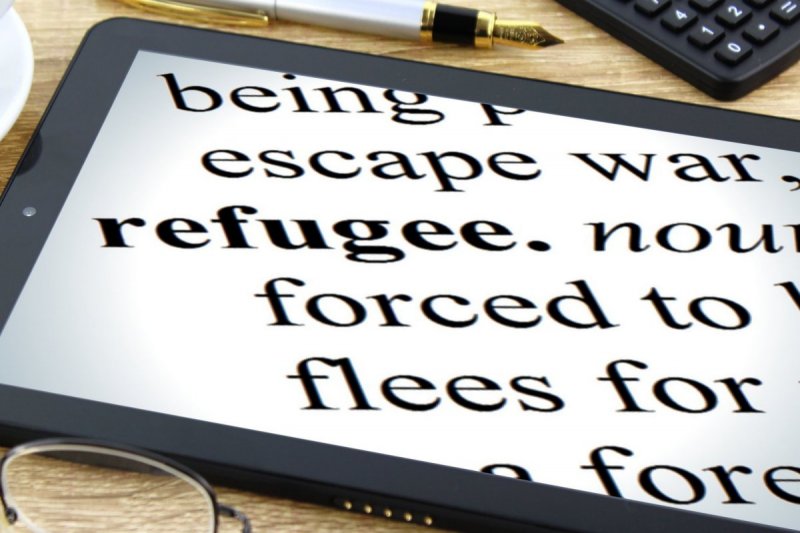By Ashnah Kalemera |
In its third round, the Africa Digital Rights Fund (ADRF) has awarded USD 138,000 to 11 initiatives responding to the digital rights fallout from the fight against the coronavirus disease (Covid-19). The grantees’ interventions span 22 African countries – the largest geographic footprint of the Fund yet – and address a range of issues including state surveillance, freedom of expression, data rights, repressive legislation, access to information, digital security and resilience.
The Unseen Eyes, Unheard Stories: Surveillance and Data Protection during COVID-19 project by a consortium consisting of ARTICLE 19 Eastern Africa, Kenya ICT Action Network (KICTANet) and Pollicy, has been awarded a grant to review Covid-19 surveillance practices in Kenya and Uganda and adherence to data protection frameworks by government and private entities in the respective countries. The resulting report will inform a webinar, social media engagements and op-eds to promote awareness and understanding of privacy and data protection online. The consortium will also develop and disseminate two documentaries capturing personal experiences of individuals who were subjected to Covid-19 contact-tracing in the two countries.
Unlike Kenya and Uganda , Namibia does not have a data protection and privacy law. In a study to inform consultations on a data protection and privacy bill, the Internet Society (ISOC) Namibia Chapter has been awarded a grant to research the country’s data protection and privacy stance over the past five years, with a focus on Covid-19 regulations.
Still on data rights, the Financial Inclusion Forum will be supported to convene Ghana’s first Data Protection and Privacy Policy Conference as a platform for financial service providers, industry regulators, and government to discuss issues of data protection and privacy in the country’s digital financial services sector. The conference will also serve as an opportunity to synthesise and validate a draft policy model on regulating the collection and sharing of consumer data in the industry.
In a test of the robustness of access to information legislation in Botswana, Nigeria, and Uganda, a grant to EndCode will enable them to explore protocols around access to critical information collected by governments in Covid-19 contact tracing databases. EndCode will use the research findings to develop an instructional video and poster series to promote awareness on the link between access to information and the right to health. This project aims to answer important questions relevant to the present pandemic context while also laying the foundation for future work and engagement with duty bearers on the right of access to information in public health contexts.
As part of its ADRF round two project on identity-driven hate speech, misinformation and harassment in African digital spaces during politically charged periods, Global Voices – Sub-Saharan Africa, Middle East and North Africa also explored native language content as advocacy and information sharing tools to combat the spread of Covid-19. Building on that and earlier work on Writing Toward Freedom: Politics and digital rights in Africa, Global Voices will use the new ADRF grant to investigate how governments attempt to control narratives around Covid-19 by favouring narratives that benefit their position or reputation amidst the pandemic and exploiting the pandemic to further clamp down on digital rights.
In this regard, Global Voices will train journalists from nine countries – Algeria, Ethiopia, Mozambique, Namibia, Nigeria, Tanzania, Tunisia, Uganda and Zimbabwe to investigate and report on the intersection of public health and digital rights – specifically how competing Covid-19 narratives flourished online and the ways in which African governments seized upon the pandemic to crack down on citizens’ rights online. The stories produced by the journalists will be published in Arabic, English, French, Portuguese, Swahili and Yoruba and promoted on social media to raise awareness of digital rights and actual and potential manipulation by governments of narratives around the pandemic.
Similarly, a grant to Tunis-based Streaming HD SARL and ISS Centre will enable them explore the impact of Covid-19 emergency responses on the digital rights landscape in the Maghreb region. In a series of themed podcasts and articles, the project will document voices of local activists and expert testimonies on privacy and contact-tracing apps, mis/disinformation online, freedom of speech restrictions, hate speech and violence against women, information transparency and accessibility, cybercrime and inclusion in Mauritania, Morocco, Algeria, Tunisia, and Libya.
Why fund Covid-19 Digital Rights Initiatives?
The 2020 State of Internet Freedom in Africa report which investigated the measures implemented by governments in Africa in fighting the Covid-19 pandemic shows that the highhandedness with which the governments and their agencies enforced the different Covid-19 preventive measures, including the suspension of rights through emergency declarations and the gagging of critical voices calling for transparency and accountability in handling the pandemic has greatly affected digital rights on the continent. According to the report, prior to and during the pandemic period, several countries enacted retrogressive laws and implemented oppressive measures that served to strengthen the state’s repressive hand at the expense of citizens’ rights.
Covid-19 response measures have re-shaped the operations of civil society organisations across the continent. In some instances, organisations have rushed to adopt various technology tools in order to continue operations while working from home, leading to new security vulnerabilities. The Digital Security Alliance hosted by Defender Protection Initiative (DPI) will assess the digital security risk exposure of 50 Ugandan civil society organisations in their pursuit to adopt technology tools for business continuity. The multi-media assessment report aims to create a shared understanding of security risks associated with technology uptake and enhance the identification of gaps for secure technology use in remote working.
In Somalia, ADRF has previously supported Digital Shelter’s work to strengthen the digital resilience of women human rights defenders. These efforts will continue with support to the Women in Media Initiative Somalia (WIMISOM) to build the digital security skills and knowledge of 150 women journalists (print, broadcast and online) and women-led media organisations as a means of combating growing online threats against the female journalists and their sources.
Whereas countries in Francophone West Africa have recorded increasing digitalisation – further boosting human rights and participatory democracy – a number of governments in the region have passed a series of laws targeting freedom of expression online. Indeed, the Media Foundation for West Africa (MFWA) has documented violations against journalists, media outlets, dissidents, bloggers, and human rights activists in West Africa for their online activities. This, according to MFWA, has led to “a rollback of the improvements in conditions for the safety of journalists, human rights defenders and citizens in the sub-region.”
With an ADRF grant, the Accra-based MFWA will conduct an analysis of recent internet and cyber-related laws in Benin, Burkina Faso, Niger, Mali, Mauritania, and Togo and highlight violations perpetrated against journalists, bloggers, activists, and human rights defenders based on these laws. The resultant policy paper and infographics will form the basis of evidenced-based advocacy for improving digital rights and freedom of expression in Francophone Africa.
Meanwhile, in November 2020 Malawi will undergo its third cycle of the Universal Periodic Review at the United Nations Human Rights Council, during which its mixed democratic credentials and digital rights record will likely feature prominently. Prevailing challenges include lack of an access to information law and limited access to the internet, which has left Malawians vulnerable to misinformation and disinformation. A recent joint civil society campaign which yielded positive policy actions – telecom companies reducing data rates – highlights the potential of coordinated civil society advocacy in influencing the country’s digital rights landscape. Accordingly, with an ADRF grant, the Centre for Human Rights and Rehabilitation (CHRR) will work to consolidate local civil society actions and voices regarding digital rights and coordinate joint strategies against regressive policy and legislative provisions.
Finally, the African Legal Think Tank on Women’s Rights has been awarded a grant to conduct an assessment on the role of the internet in fuelling the growth of human trafficking, including online recruitment and advertisement. With a focus on the Democratic Republic of Congo, The Gambia, and Mauritania, the assessment will feed into the development of a curriculum and a digital campaign targeted at survivors and networks working to combat human trafficking, with the aim of equipping them with tools to influence prevention and protection strategies.
The ADRF third round grantees brings to 33 the number of initiatives supported with a total sum of USD 355,000 since the Fund’s launch in April 2019.
| Round One | Round Two | Round Three | |
| Total Award Amount | USD 65,000 | USD 152,000 | USD 138,000 |
| Initiatives Supported | 1. Access for All 2. African Human Rights Network (AHRN) Foundation 3. Burundi Youths Training Centre 4. Centre for Human Rights, University of Pretoria 5. Freedom of Expression Hub (FoE Hub) 6. Global Voices – Sub-Saharan Africa, Middle East and North Africa 7. Internet Society (ISOC) Namibia Chapter 8. Jonction 9. Kuza STEAM Generation (KsGEN) and Centre for Youth Empowerment and Leadership (CYEL) 10. YMCA Computer Training Centre and Digital Studio |
1. Action et Humanisme 2. ADISI Cameroun 3. African Feminism 4. CUTS- Centre for International Trade, Economics and Environment 5. Digital Shelter 6. Forum de Organizacoes de Pessoas com Deficiencia (Mozambique Disabled Persons Orgazations Forum) 7. Global Voices – Sub-Saharan Africa, Middle East and North Africa 8. iWatch Africa 9. Jamii Forums 10. JP MEDIA and Sobanukirwa 11. Mzalendo Trust 12. Rudi International 13. Somaliland Journalists Association (SOLJA) 14. Zimbabwe Centre for Media and Information Literacy (ZCMIL) in collaboration with the National University of Science and Technology (NUST) |
1. African Legal Think Tank on Women’s Rights 2. Centre for Human Rights and Rehabilitation (CHRR) 3. Consortium consisting of Pollicy, Kenya ICT Action Network (KICTANet), and ARTICLE 19 Eastern Africa 4. Defenders Protection Initiative (DPI) 5. EndCode Proprietary 6. Financial Inclusion Forum 7. Global Voices – Sub-Saharan Africa, Middle East and North Africa 8. Internet Society (ISOC) Namibia Chapter 9. Media Foundation for West Africa (MFWA) 10. Streaming HD SARL and ISS Center 11. Women In Media Initiative Somalia (WIMISOM) |
| Countries Covered | 16 – Algeria, Burundi, Egypt, Ethiopia, Gambia, Mozambique, Namibia, Nigeria, Sierra Leone, Senegal, South Sudan, Tanzania, Tunisia, Uganda, Zambia, and Zimbabwe | 18 – Algeria, Cameroon, Democratic Republic of Congo, Ethiopia, Ghana, Ivory Coast, Kenya, Malawi, Mozambique, Nigeria, Rwanda, Somalia, Somaliland, Sudan, Tanzania, Tunisia, Uganda, and Zimbabwe | 22 – Algeria, Benin, Botswana, Burkina Faso, Democratic Republic of Congo, Ethiopia, The Gambia, Ghana, Kenya, Libya, Mali, Mauritania, Morocco, Mozambique, Namibia, Niger, Nigeria, Tanzania, Togo, Tunisia, Uganda, and Zimbabwe |
The ADRF is an initiative of the Collaboration on International ICT Policy for East and Southern Africa (CIPESA) with support from the Ford Foundation, the Swedish International Development Cooperation Agency (Sida), the German Society for International Cooperation Agency (GIZ), and the Omidyar Network.

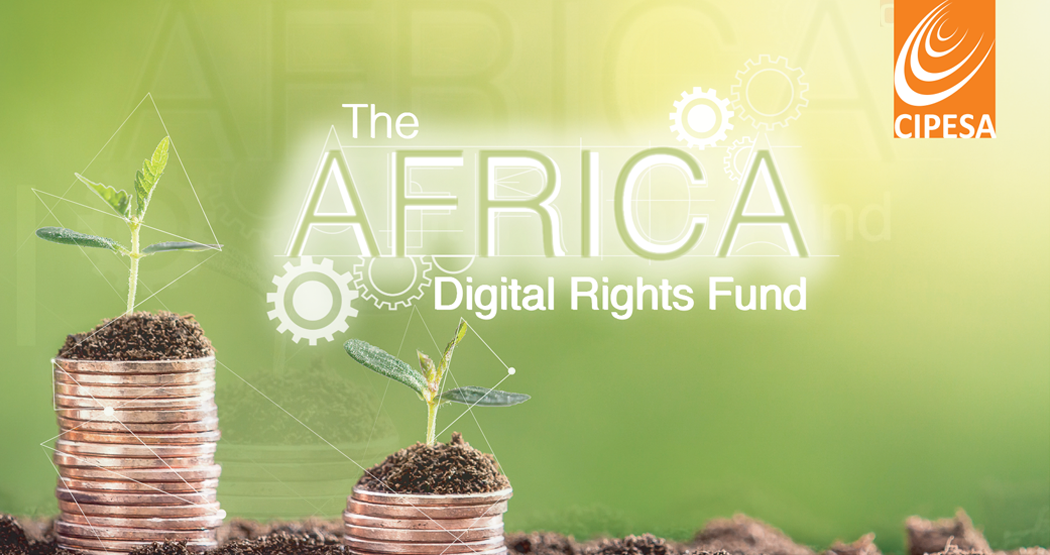
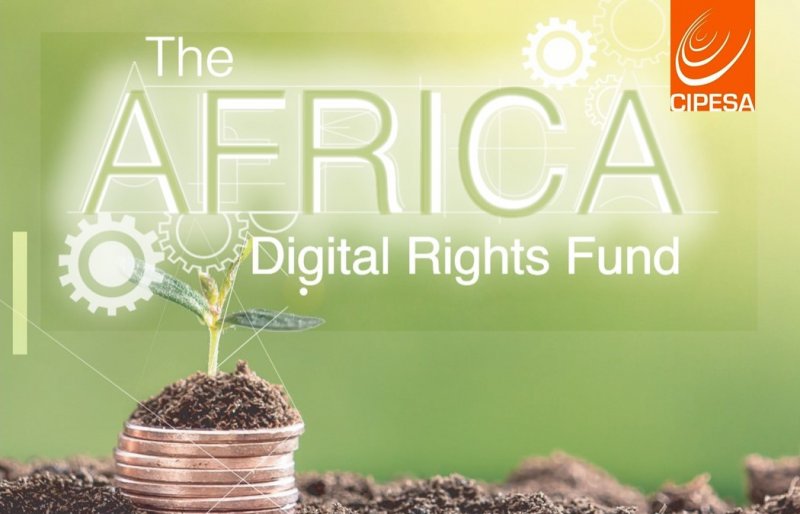
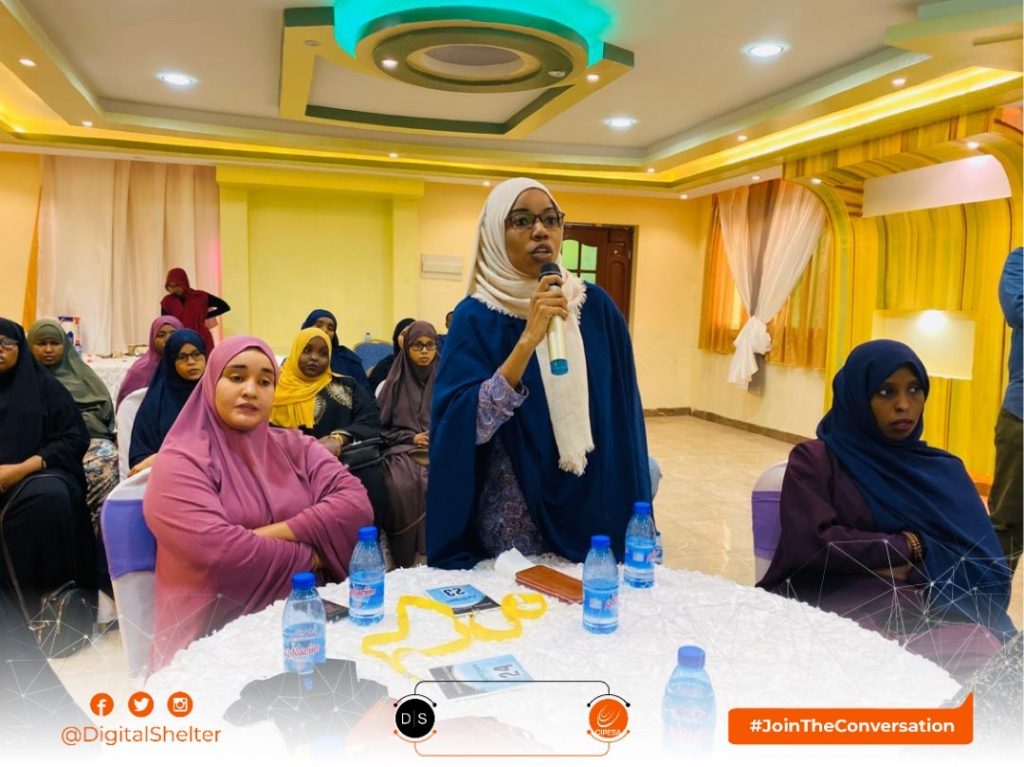

 Highlighting the issue of online violence against women was Sucdi Dahir Diriye, a passionate community volunteer and member of
Highlighting the issue of online violence against women was Sucdi Dahir Diriye, a passionate community volunteer and member of  Based on their personal and professional experiences, the panelists stressed the need for counter measures against the prevailing threats. Among the recommendations made was increased digital security skills and knowledge building among activists, bloggers and media professionals. Specialized training on gendered online harassment was encouraged. Panelists also emphasized a dual approach in voice amplification – online and offline to reach wider audiences. Furthermore, more stakeholder dialogue to raise awareness on online civic space and digital rights, including data protection and privacy inline with Somalia’s growing technology sector. Other recommendations included research undertakings on current digital threats in Somalia, to inform advocacy and policy interventions; and establishment of a solidarity network to support victims of online attacks.
Based on their personal and professional experiences, the panelists stressed the need for counter measures against the prevailing threats. Among the recommendations made was increased digital security skills and knowledge building among activists, bloggers and media professionals. Specialized training on gendered online harassment was encouraged. Panelists also emphasized a dual approach in voice amplification – online and offline to reach wider audiences. Furthermore, more stakeholder dialogue to raise awareness on online civic space and digital rights, including data protection and privacy inline with Somalia’s growing technology sector. Other recommendations included research undertakings on current digital threats in Somalia, to inform advocacy and policy interventions; and establishment of a solidarity network to support victims of online attacks.
